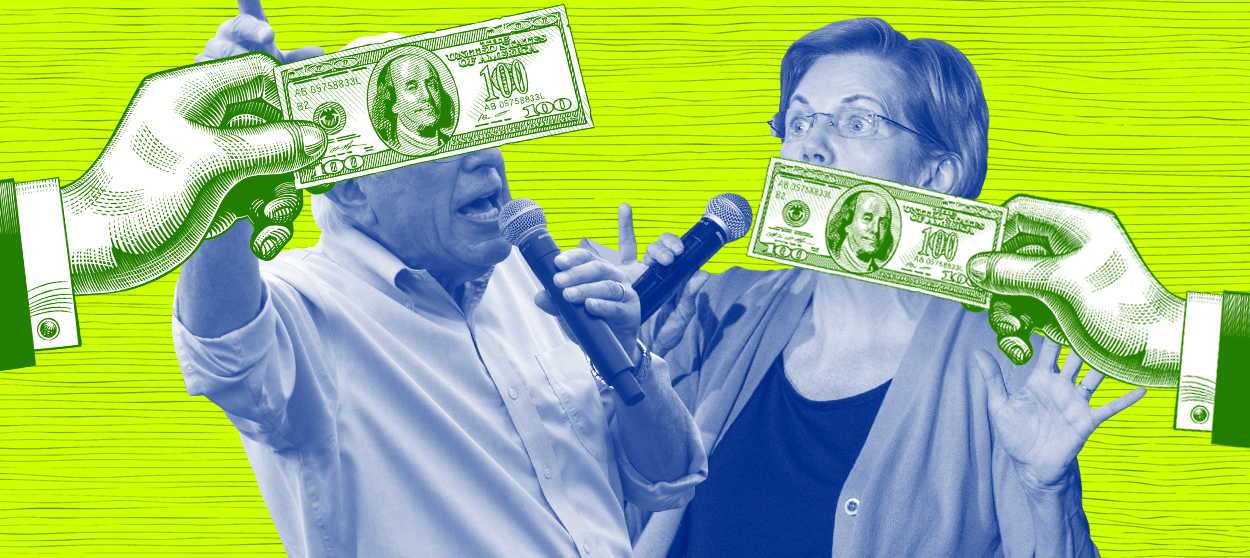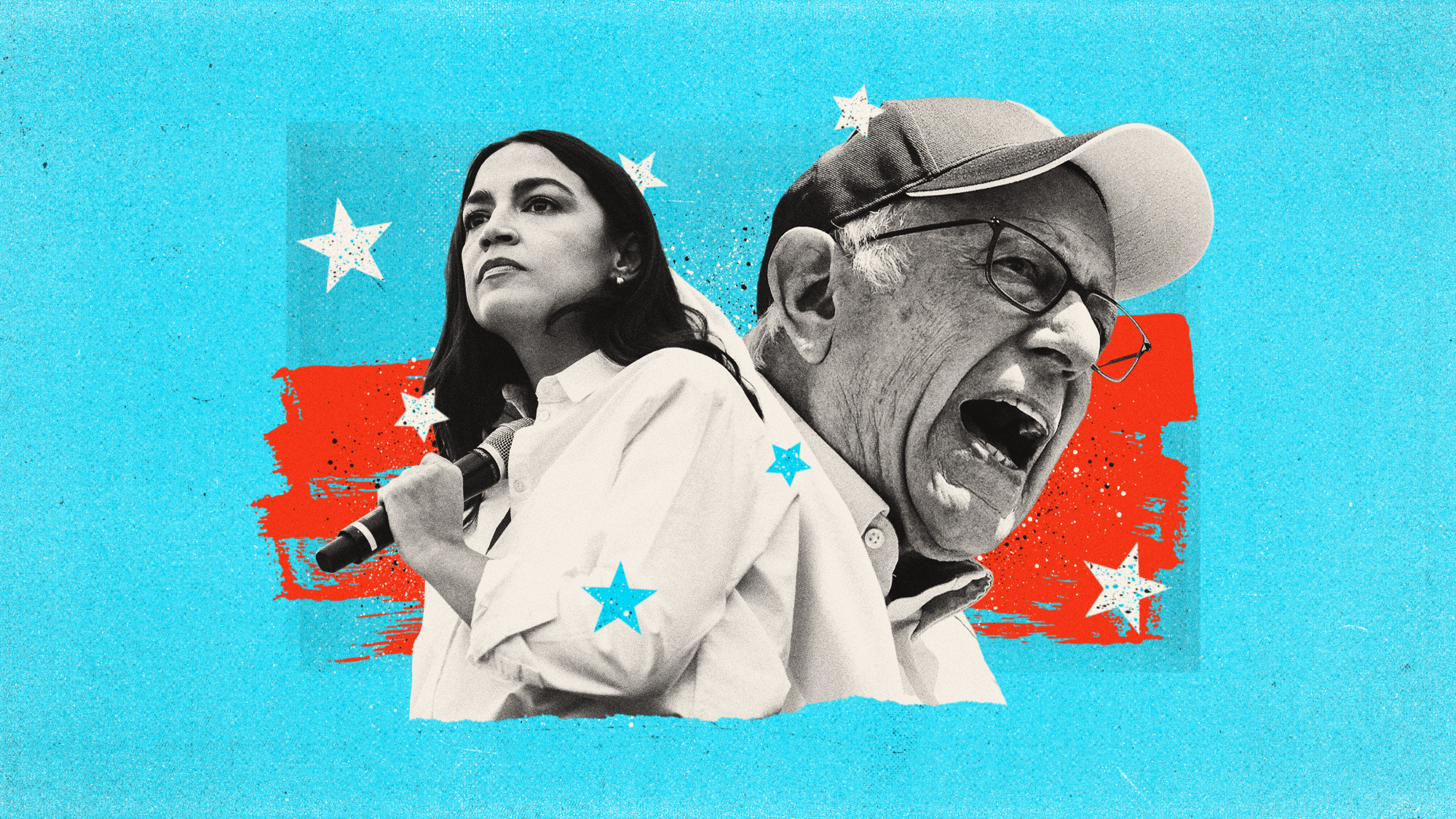How corporate zillionaires could prove Bernie Sanders and Elizabeth Warren wrong
A three-step plan to show you care about more than your own wallets


A free daily email with the biggest news stories of the day – and the best features from TheWeek.com
You are now subscribed
Your newsletter sign-up was successful
America's top business titans apparently discovered a conscience over the weekend! The Business Roundtable — a big association of CEOs including Jeff Bezos, Tim Cook, Brian Monyihan, Jamie Dimon, and many others — announced on Monday that they were rolling back the shareholder value revolution. No longer will a company's share price be the number one business priority, they said. Instead workers, suppliers, customers, and the environment are going to share pride of place at the top.
Capitalism haters like the notorious socialist Larry Summers were skeptical. "I worry the Roundtable's rhetorical embrace of stakeholders is in part a strategy for holding off necessary tax and regulatory reform," he told the Financial Times.
But I have faith — and a little advice. Here are three quick and easy tips for how America's patriotic CEOs can prove Bernie Sanders and Elizabeth Warren wrong. Business does not need drastic new regulations like Warren's plan to bust up Big Tech and regulate Wall Street, or Sanders' proposal to drastically increase taxes on corporations and the rich. These chaps truly are all about reforming U.S. business to help everyone, and not just trying to protect their gargantuan pocketbooks with a lot of cheap talk.
The Week
Escape your echo chamber. Get the facts behind the news, plus analysis from multiple perspectives.

Sign up for The Week's Free Newsletters
From our morning news briefing to a weekly Good News Newsletter, get the best of The Week delivered directly to your inbox.
From our morning news briefing to a weekly Good News Newsletter, get the best of The Week delivered directly to your inbox.
1) Raise taxes on themselves and their businesses. The last decade has been absolutely fantastic for corporate executives and the investor class. Corporate profits' share of GDP has been at or above historic highs since 2009. The ultra-wealthy are seeing enormous income gains while the middle class stagnates. CEO compensation has grown 980 percent since 1978, while the typical worker salary has grown only 12 percent.
Moderate, sensible businessmen (like Chester Bowles in his day) understand that such a situation is economically destabilizing and politically dangerous. An advanced, mass-consumption economy requires a broad distribution of income so the people have the money to purchase the goods and services produced by business — a nation with severe inequality is prone to economic depression. Meanwhile, a wildly unfair economy breeds authoritarian extremism and demagogues.
Lobbying to sharply raise taxes on the very rich — particularly on capital gains and hedge fund income — can ameliorate this situation, and still leave business tycoons with more than enough money to live a life of wretched, gushing excess. A slightly-smaller seventh yacht is a small price to pay to keep the good ol' U.S.A. in fighting trim. That in turn would free up some revenue, as executives would be less inclined to bargain for a bigger pay package and investors less inclined to demand payouts if Uncle Sam took more of the proceeds, so business could invest in capital, maintenance, and R&D on which they have scrimped of late. A responsible businessman invests for the future!
2) Help extirpate Big Carbon. The world dependence on fossil fuel energy is threatening the future of human society — and that includes business. What's going to happen to the Miami real estate market, for one, if it's 50 miles out to sea? Who will buy soybean futures if half the agricultural land on earth becomes a desert? Think of all the rich investors with houses in fire-prone Malibu! Not to mention that seawalls and one weather disaster cleanup after the next are going to cost lots of tax money.
A free daily email with the biggest news stories of the day – and the best features from TheWeek.com
The Business Roundtable membership includes the heads of oil companies ExxonMobil, BP, and Chevron. For the good of the business community (and future human civilization), they should be required to transform into clean energy companies within five years or be kicked out, and the remaining CEOs should unite behind a crash decarbonization program. This would of necessity include regulations keeping most existing fossil fuel reserves in the ground. For the good of American capitalism, the business of digging up carbon fuel and setting it on fire must be stopped forever.
3) Break their companies into pieces. One enormous factor in the above-mentioned profits bonanza is how vast swathes of the American marketplace have been rolled up into oligopolies. Retail, banking, agriculture, pharmaceuticals, hospitals — if you can name it, there's likely very much less competition than there was 40 years ago.
Business Roundtable members are ideally placed to get out ahead of new anti-trust regulation. Every major market where, say, five or fewer companies account for more than half the sales can be de-concentrated by the largest company voluntarily breaking itself into two, then the next-smallest if that doesn't do the trick, and so on. This would help suppliers by giving them more than one buyer of their products, help workers by ensuring there is more than a few companies to bid for their labor, help consumers by providing a decent menu of choices in all markets, and help new entrepreneurs by making it possible to compete again.
Besides, a good businessman thrives on competition. The very engine of capitalism is supposed to be the desire to make a profit by inventing a better widget. Surely our top CEOs are hungry to prove themselves in a rough-and-tumble market — what business school graduate wants to just sit atop a vast empire and collect giant fat profits while doing not much of anything? How would that create jobs?!
Nothing could prove Bernie Sanders and Elizabeth Warren more correct about their acerbic view of American business than by this new Business Roundtable effort turning out to be mere wind — if Jamie Dimon et al. continue to plow their profits into dividends and share buybacks, only now hidden behind some progressive rhetoric and maybe a few quarters dribbled out to the rest of society. But I have confidence. Business is the foundation of American society — and CEOs will surely prove it very soon by ceasing to devour it from the inside.
Ryan Cooper is a national correspondent at TheWeek.com. His work has appeared in the Washington Monthly, The New Republic, and the Washington Post.
-
 Political cartoons for February 3
Political cartoons for February 3Cartoons Tuesday’s political cartoons include empty seats, the worst of the worst of bunnies, and more
-
 Trump’s Kennedy Center closure plan draws ire
Trump’s Kennedy Center closure plan draws ireSpeed Read Trump said he will close the center for two years for ‘renovations’
-
 Trump's ‘weaponization czar’ demoted at DOJ
Trump's ‘weaponization czar’ demoted at DOJSpeed Read Ed Martin lost his title as assistant attorney general
-
 The billionaires’ wealth tax: a catastrophe for California?
The billionaires’ wealth tax: a catastrophe for California?Talking Point Peter Thiel and Larry Page preparing to change state residency
-
 Mamdani vows big changes as New York’s new mayor
Mamdani vows big changes as New York’s new mayorSpeed Read
-
 Bari Weiss’ ‘60 Minutes’ scandal is about more than one report
Bari Weiss’ ‘60 Minutes’ scandal is about more than one reportIN THE SPOTLIGHT By blocking an approved segment on a controversial prison holding US deportees in El Salvador, the editor-in-chief of CBS News has become the main story
-
 Has Zohran Mamdani shown the Democrats how to win again?
Has Zohran Mamdani shown the Democrats how to win again?Today’s Big Question New York City mayoral election touted as victory for left-wing populists but moderate centrist wins elsewhere present more complex path for Democratic Party
-
 Millions turn out for anti-Trump ‘No Kings’ rallies
Millions turn out for anti-Trump ‘No Kings’ ralliesSpeed Read An estimated 7 million people participated, 2 million more than at the first ‘No Kings’ protest in June
-
 Ghislaine Maxwell: angling for a Trump pardon
Ghislaine Maxwell: angling for a Trump pardonTalking Point Convicted sex trafficker's testimony could shed new light on president's links to Jeffrey Epstein
-
 The last words and final moments of 40 presidents
The last words and final moments of 40 presidentsThe Explainer Some are eloquent quotes worthy of the holders of the highest office in the nation, and others... aren't
-
 The anger fueling the Bernie Sanders and Alexandria Ocasio-Cortez barnstorming tour
The anger fueling the Bernie Sanders and Alexandria Ocasio-Cortez barnstorming tourTalking Points The duo is drawing big anti-Trump crowds in red states
